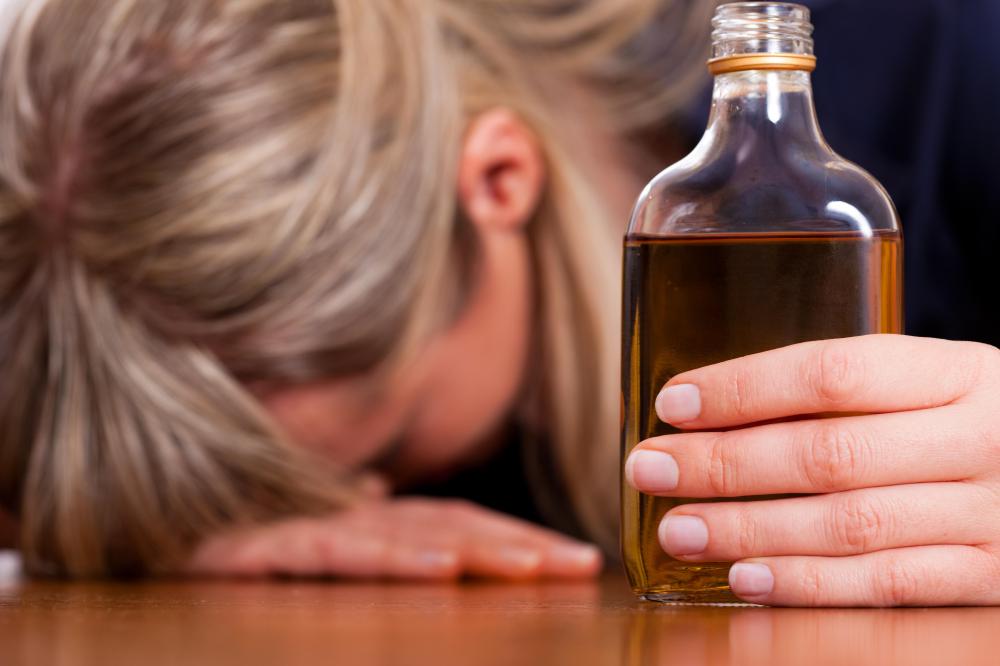At WiseGEEK, we're committed to delivering accurate, trustworthy information. Our expert-authored content is rigorously fact-checked and sourced from credible authorities. Discover how we uphold the highest standards in providing you with reliable knowledge.
How are Alcohol and Depression Related?
There is indeed a relationship between alcohol and depression, but it has proven difficult to say if the abuse of alcohol contributes to depression or if depression triggers problems with alcohol. Both trains of thought have some basis in fact, and studies on the connection between alcohol and depression have yielded decidedly different results. Most experts agree that alcohol is a depressant, and those who suffer from clinical depression should not consume it during treatment.
Chemically, ethyl alcohol is considered a depressant, which means it suppresses or slows the natural function of whatever system or organ it encounters in the body. Once alcohol crosses the blood/brain barrier, it essentially numbs the areas of the brain responsible for rational thought processes and mood control. While the short-term effect of alcohol may be feelings of euphoria or a lowering of social inhibitions, in the long run alcohol often triggers feelings of confusion, sadness and hopelessness. These symptoms also occur in people diagnosed with clinical depression.

An addiction to alcohol is not necessary in order to have feelings of despair, loneliness and sadness associated with depression. However, a number of people who suffer from depression will seek out depressants such as alcohol or Valium® as a form of self-medication. The momentary sensation of euphoria and mental relaxation experienced while intoxicated is thought to offset the painful sensations caused by depressive thoughts. In this sense, depression triggers an interest in a legal depressant available without a prescription or doctor's exam.

Some studies suggest the link between alcohol and depression begins with alcohol. People who exhibit no symptoms of clinical depression may decide to drink alcohol to excess, especially during late adolescence and early adulthood. This recreational or social drinking habit may trigger a genetic predisposition towards clinical depression or other mental illnesses. A moderate to heavy drinker could fall into a state of depression after suffering the physical, mental and social problems associated with alcoholism. It could be argued that alcohol abuse leads to depression, because many alcoholics lose their support networks and have a difficult time living on their own.

One study on the connection between alcohol and depression focused on the differences between men and women in terms of coping with clinical depression. The study found that, in general, men tended to become depressed after developing problems with alcohol, while women often turned to alcohol after becoming clinically depressed. In either case, many psychiatrists warn against using alcohol in combination with prescription anti-depressants because the interaction can prove fatal. Depression is primarily caused by an imbalance of mood-stabilizing chemicals, and the continued use of alcohol can negate the effectiveness of mood-enhancing drugs prescribed for depression.
AS FEATURED ON:
AS FEATURED ON:




















Discussion Comments
@Iluviaporos - I think everyone reacts in different ways to alcohol (and to depression for that matter) and there's no use generalizing about it. But I also think people should be honest with themselves. I suspect most people know if they've got a problem and just need to admit it to themselves in order to find help.
@indigomoth - You're right though that people who indulge in that kind of behavior often end up as alcoholics, because they find they can't express their emotions any other way. And it's rare that simply talking about something while you're drunk is actually going to change it or make it better.
Which is why we have the stereotype of the sad drunk, constantly sitting in the bar to escape his terrible life. His alcohol use and his depression may not be physically related, but he thinks the only way to get rid of his sad feelings is to drink them away and so he never truly gets rid of them.
I actually think I'm lucky I never got addicted to alcohol, because I absolutely remember using it as a way to vent emotions when I was at university. If I was really upset about something but didn't feel like I could express it, I would basically drink until I was almost out of control and then I would finally be able to cry or get angry or whatever.
When I think about it now, it was obviously an unhealthy and dangerous thing to do, but I wasn't really aware of that back then. And to be honest, I would usually feel better in the aftermath, because at least I had managed to say or do what I needed to express the emotion.
So, I guess, for me alcohol actually helped to alleviate the effects of depression.
Post your comments